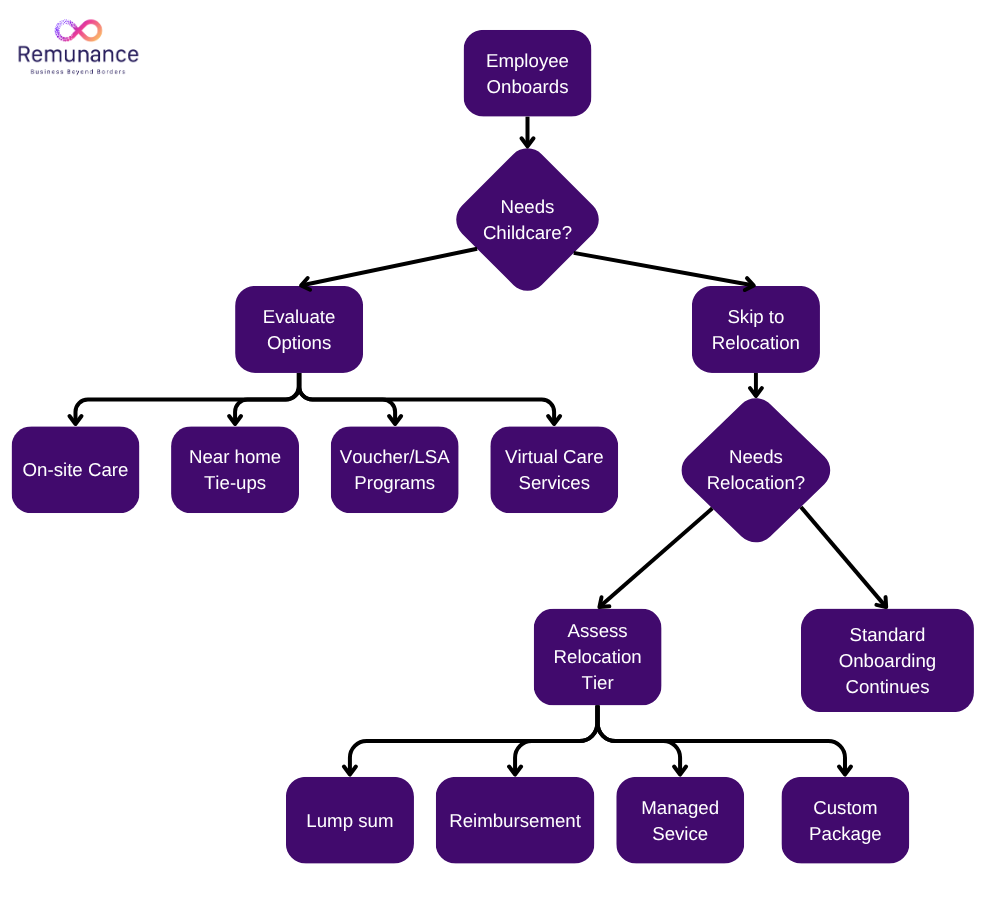Summary
Indian companies support employees with structured childcare programs and relocation packages. This blog shares HR strategies. They aim to boost retention, improve productivity, and support hybrid work. It covers legal mandates, on-site care, and tiered relocation benefits.
Indian companies are changing their HR practices. Global talent mobility is rising, and they want to focus on employee well-being. Support for childcare and relocation is vital for a good employee experience today. These benefits are no longer optional; they’re expected.
This blog explains how top Indian companies build and enhance programs. These programs aim to attract, retain, and support talent across the country.
Childcare Support Programs in Indian Companies
Maternity Benefit (Amendment) Act, 2017
The Maternity Benefit (Amendment) Act, 2017, was a key moment for corporate childcare support in India. This mandates creche facilities for companies with 50+ employees. While originally a compliance obligation, the law sparked a shift in perception. Today, top companies see childcare as more than a legal obligation. They view it as a way to boost productivity and keep employees.
Common Corporate Models of Childcare Support
-
On-Site Childcare Facilities
Large enterprises often build childcare centers within their campuses. They offer certified caregivers and safe play areas. Parents can also stay close to their kids while they work.
Companies like Zoho and TCS run childcare centers right in their offices. This helps parents get back to work faster and cuts down on absenteeism.
-
Partnered Near-Home Daycare Access
To align with hybrid work, many firms now tie up with daycare chains near employees’ homes. Employees choose locations most convenient to them, improving attendance and work-life balance.
Trend Insight: In 2023, more than 60% of mid- to large-scale companies in India use this model. This is especially true in metro areas where commuting is a big issue.
-
Reimbursement and Voucher-Based Support
Firms allocate a monthly childcare allowance or reimburse daycare costs. These can range between ₹6,000–₹12,000 per child.
Note: Sanofi and Infosys provide these benefits. They are usually included in Lifestyle Spending Accounts (LSAs).
-
Virtual Childcare Models
Remote-friendly benefits are:
-
- Virtual babysitters
- Learning modules
- Storytelling sessions
- Parental coaching via video platforms
These began during the pandemic. Now, many global firms with Indian teams offer them regularly.
Advancing Beyond Compliance: Inclusive and Flexible Benefits
Indian firms leading in childcare benefits go well beyond mandatory norms:
-
- Extended Age Coverage: Benefits often support children up to 10 years, not just 6.
- Meesho and Fidelity offer childcare support to all parents, not just moms.x
- Hybrid Care Models: Blended on-site + near-home + virtual support is now the gold standard.
- Dedicated Budgeting: A shift from 0% allocation in 2017 to 2–5% of total HR budgets today.
Relocation Packages: Modern Practices in Indian Companies
Core Components of a Standard Relocation Package
Relocation is not just about moving someone. It’s about being consistent, earning trust, and helping people adjust to new cultures. Comprehensive packages in India typically include:
-
Moving & Logistics
-
- Packing and transport by professional vendors
- Transit insurance
- Vehicle shifting
- Expense coverage for travel of employee and dependents
-
Housing Assistance
-
- Temporary housing for 30–60 days post-move
- House-hunting trip costs reimbursed
- Rental support and deposit advances for high-rent cities
-
Family Integration Support
-
- Spouse employment support
- Schooling help for children
- Cultural training, especially for interstate relocations
Tiered Relocation Packages Based on Employee Segmentation
Not every relocation is treated the same. Indian employers increasingly implement tier-based relocation structures depending on employee grade, location, and assignment type.
| Tier | Employee Level | Support Elements |
| 1 | Entry-level to Mid | Lump-sum allowance, travel, basic housing support |
| 2 | Senior Management | Managed relocation, family benefits, rental assistance, house-hunting trips |
| 3 | CXOs & Expat Hires | End-to-end relocation, cultural training, tax optimization, children’s education |
Types of Relocation Structures Adopted in India
1. Lump-Sum Relocation Grants
Fixed one-time payments based on distance, family size, and job level. Employees handle logistics and vendors.
Pros:
-
- Fast
- Scalable for HR teams
Cons:
-
- Puts planning burden on employees
- Hard to track usage
2. Reimbursement-Based Programs
Employees pay first, submit bills for approved costs.
Pros: You have high control, and it ensures expenses are legitimate.
Cons: Processing is slower, and people often resist due to initial costs.
3. Fully Managed Relocation Services
Outsourced relocation firms handle everything: from movers to cultural onboarding.
Use Case: This is common for IT majors like Infosys and Wipro, as well as MNCs like Deloitte. It applies to high-level or cross-state transfers.
4. Modular Benefits with Flexibility
Companies offer customizable relocation benefits through portals or HR tools. Employees select services based on need.
Trend Alert: This model is getting popular. It offers a good mix of structure and personalization.
Financial Engineering Within Relocation Benefits
Modern HR leaders team up with finance and compliance to handle relocations. They focus on making these processes cost-effective and legally sound.
Key Financial Elements:
-
- Cost of Living Adjustments (COLA): Salary hikes for transfers to Tier-1 metros
- Settling-In Allowances: To cover furniture, utensils, internet setup, etc.
- Tax Compliance Support: Advisory on whether benefits are taxable or reimbursable
- Repayment Clauses: Binding employees to service commitments post-relocation (usually 12–24 months)
Legal and Compliance Best Practices
Employers must ensure all benefits align with legal frameworks:
-
- Maternity Benefit (Amendment) Act, 2017: Mandatory creche support for 50+ employee firms
- Labour Law Compliance: Timely reimbursements and fair treatment
- Data Privacy Laws: Secure handling of family, school, and health data during relocation
- Service Agreements: Clearly drafted benefit and clawback policies
Final Thoughts: Benchmarking the Future of HR in India
Childcare and relocation programs are now standard for top talent. They are no longer just perks. Companies that focus on these two areas cut attrition. They also boost productivity and loyalty. The future is for employers who mix these offerings into their employee experience strategy.
Want help building childcare or relocation policies that give you a talent edge?
We provide complete HR and compliance support. Our goal is to create benefits that keep and empower your Indian workforce.




 Schedule a free call
Schedule a free call